- Home
- Karen Kingsbury
Where Yesterday Lives
Where Yesterday Lives Read online
PRAISE FOR
KAREN KINGSBURY’S BOOKS
When Joy Came to Stay
“Kingsbury confronts hard issues with truth and sensitivity.”
FRANCINE RIVERS, bestselling author of Leota’s Garden
“Kingsbury’s poignant tale of a lost and broken family and how they experience God’s miraculous healing is a sure guarantee to bring hope and joy to her readers.”
MELODY CARLSON, author of Diary of a Teenage Girl
“A thought-provoking account of the battle of depression in a believer’s life. It leaves no doubt that God is loving, merciful, and faithful.”
NANCY MOSER, author of The Seat Beside Me
A Moment of Weakness
“Kingsbury spins a tale of love and loss, lies and betrayal, that sent me breathlessly turning pages…”
LIZ CURTIS HIGGS, bestselling author of
Bookends and Bad Girls of the Bible
“A gripping love story. A Moment of Weakness demonstrates the devastating consequences of wrong choices, and the long shadows deception casts over the lives of God’s children. It also shows the even longer reach of God’s providence, grace, and forgiveness.”
RANDY ALCORN, bestselling author of Deadline and Dominion
“One message shines clear and strong through Karen Kingsbury’s A Moment of Weakness: Our loving God is a God of second chances.”
ANGELA ELWELL HUNT, bestselling author of The Note
Waiting for Morning
“What a talent! I love her work.”
GARY SMALLEY, bestselling author
“Waiting for Morning will remind believers of God’s mercy and challenge them to pray for America. The book…reveals God’s awesome love and His amazing ability to turn moments of weakness into times of strengthening.”
CHRISTIAN RETAILING, Spotlight Review
From Readers
“Your books are like cheesecake…. One is never enough.”
—C. W.
“I have never had novels affect me as deeply as yours have.”
—L. B.
“No other author has made me cry and laugh so much in one book.”
—L. L.
“I am amazed at how addicted I have become to your books.”
—A. S.
“What a marvelous talent God has given you.”
—L. V.
“You are my favorite author, and I do a lot of reading.”
—L. J.
“If there were more Christian novels like yours, this world would be a better place.”
—A. D.
“You are unbelievably gifted. In my mind, you are to inspirational fiction what Charlie Parker was to the saxophone, what Mark McGwire is to the home run, what Michael Jordan is to basketball, what Tiger Woods is to golf. You are that good.”
—M. A.
“Thank you so much for writing such wonderful books…. They are hazardous to my housework!”
—L. B.
“When I think you can’t top your last book, you go and do it again.”
—D. R.
NOVELS BY KAREN KINGSBURY
Where Yesterday Lives
When Joy Came to Stay
A Time to Dance
On Every Side
A Time to Embrace
One Tuesday Morning
Oceans Apart
Beyond Tuesday Morning
FOREVER FAITHFUL SERIES
Waiting for Morning
A Moment of Weakness
Halfway to Forever
REDEMPTION SERIES WITH GARY SMALLEY
BOOK 1: Redemption
BOOK 2: Remember
BOOK 3: Return
BOOK 4: Rejoice
BOOK 5: Reunion
Contents
Cover
Title Page
Dedication
Acknowledgements
Prologue
Chapter One
Chapter Two
Chapter Three
Chapter Four
Chapter Five
Chapter Six
Chapter Seven
Chapter Eight
Chapter Nine
Chapter Ten
Chapter Eleven
Chapter Twelve
Chapter Thirteen
Chapter Fourteen
Chapter Fifteen
Chapter Sixteen
Chapter Seventeen
Chapter Eighteen
Chapter Nineteen
Chapter Twenty
Chapter Twenty-one
Chapter Twenty-two
Chapter Twenty-three
Chapter Twenty-four
Chapter Twenty-five
Chapter Twenty-six
Chapter Twenty-seven
Chapter Twenty-eight
Chapter Twenty-nine
Chapter Thirty
Chapter Thirty-one
Chapter Thirty-two
Chapter Thirty-three
Author’s Note
About the Author
Other Books By This Author
Excerpt of Waiting for Morning
Copyright
Dedicated to Dad, that in seeing today what could be tomorrow, you would never wonder how very much you are loved.
Mom, for being forever dependable. Your love has no limits.
My husband, my best friend, whose Bible is anything but dusty. Walking through life by your side is the greatest thing this side of heaven. Thank you for loving me enough to tell me the Truth. I love you always.
Kelsey my sweet daughter. Your love for Jesus is as beautiful as the light in your eyes, the warmth in your smile.
Ty, my tenderhearted boy. I treasure watching you walk and grow in the image of your daddy, as he continues to walk and grow in the image of our heavenly Father.
Austin, our little Isaac. God blessed us with you not once, but twice. You will always be a living reminder that God still works miracles among us. I can’t wait to see the great things He has planned for you!
And to God Almighty, who has for now blessed me with these.
Acknowledgements
Like any writer, I draw from my experience and the experiences of others when I bare my heart in a work like Where Yesterday Lives. And so I thank these who make up my own yesterdays…Donald, of course, and Dad, Mom, Sue, Chris, David, Tricia, Lynne, and Todd. Reporter friends I have known and worked with, and my longtime friend, Lisa. Also thanks to those others who played an integral part in building my scrap-book of rainy-day memories. I remember you fondly.
This book could not have come together without the talented efforts of one very special editor and friend, Karen Ball. Thanks for believing in me and Where Yesterday Lives. And thanks for making me a better writer in the process. I’m excited about what God has planned in all this.
Thanks to Dad, Tricia, Gina, Sherri, Michelle, Natalie, Rene, Wendy, and Betty for your feedback and encouragement in the initial process of writing this book. And finally, a special thanks to Rene, Dawn, and Amber for watching my little ones while I snuck an hour or two to write. May God bless your servant hearts.
Prologue
PETOSKEY, MICHIGAN-JULY 10, 1998
The first wave of pain seized his chest like a vice grip so that his hand flew to his heart and he gasped for breath. The second wave sent him to his knees. He felt his face contort from the pain, and he forced himself to concentrate on surviving.
Help! The word formed on his lips and died there.
Air refused to move in and out of his body, and his lungs screamed for relief. The pain intensified; the grip tightened. There was tremendous pressure now, as if a cement truck had stalled directly over his heart.
He clutched harder at his chest, ripping a button from his shirt. In th
e recesses of his mind, in the only place that was not consumed with pain, he knew what was happening.
His body crumpled slowly onto the matted brown carpet that lined the hallway. Get up! his mind screamed. But he remained motionless, every muscle convulsing in pain. Sweat beaded up on his forehead and his face seemed surrounded by flames. Frantically he gazed upward until he found the photographs that lined the walls.
His eyes darted across the familiar faces.
Another wave hit, and he squinted in agony, staring at the people in the photos, seeing them when they were young.
When they still liked each other.
He wondered if they knew how much he loved them and suddenly a million memories fought for his attention. Once more he tried to speak, to summon help, but no sound escaped and his eyelids grew heavier.
The strongest pain of all hit then, and in the haze of agony he calculated how much time had passed. How much remained.
He could no longer keep his eyes open—a fact that brought overwhelming sadness. He wanted to see them once more, the photographs…the people who lived in them. He struggled with every bit of his waning energy, but his eyes remained closed.
There was a ringing sound in his ears now and he became light-headed. He was fainting, losing consciousness. He told himself that perhaps he was no longer having a heart attack but rather giving in to an overwhelming urge to sleep. He relaxed and let himself be sucked into the feeling.
Then one last time searing pain coursed through his body, and he remembered what was happening. Someone seemed to be shouting at him now.
Wake up! Wake up! Wake up!
He tried to move, to open his eyes. But he was slipping further away and it was too hard to come back. For the briefest moment, he thought again of the people in the photographs…and he prayed they would forgive him.
As he did so, the pain eased dramatically.
Then there was only darkness.
One
A dense blanket of heat and humidity covered the Florida peninsula the afternoon of July 10, but at the climate-controlled offices of the Miami Times the unending process of news-gathering continued at a frenetic pace.
That Friday afternoon, while the city sweltered under record-breaking temperatures, the editors sat quietly at their desks in the center of the newsroom and Ellen Barrett, back from a morning of interviews, worked intently at her computer several feet away.
“Jim, tell me there’s not something more to this murder.” She held up a news clipping and strained to see Jim Western. Jim sat in the cubicle immediately in front of her and worked the environmental beat, dealing with illegal chemical dumping and polluted harbors. He was not interested in homicides.
“Sounds fishy.” His eyes remained focused on his own computer screen and the story he was writing. Ellen watched for a moment, fascinated with his neatly arranged notes, his clean desk, and the way he typed using only his index fingers.
“More than fishy.” She reached for her coffee and took a sip, wiping the moist condensation off the notepad where the cup had been sitting. Her eyes traveled across her desk, searching for a clear spot. She alone could make sense of the disaster that was her work area. Somewhere, buried under layers of rumpled notes, was a picture of her and Mike on their wedding day and a Bible he had given her three years ago. It was dusty now, though its pages were stiff and clean—much as they had been when she received it.
Ellen studied the heap of papers and, as she had once a month for the past year, made a mental note to get organized. For now she pushed her keyboard back and set the hot drink in the space it created.
She looked at Jim again. “Guy lives his whole life in his father’s shadow, tells his friend he hates the old man, and next thing we know Dad opens the door and gets blown away by an AK-47 on the Fourth of July.”
“Some holiday.”
“Neighbors think it’s fireworks and no one sees a gunman. What does the grieving son do? Hops in Dad’s shiny, new Corvette and shows it off to half the people in town.”
“Fishy.”
“Not to mention the tidy insurance settlement sonny boy figures to get now that Dad’s gone.”
“Very fishy.”
“Know what I think?”
Jim sighed. “What?”
“Prison time for sonny boy.”
“Hmm, yes.” Jim continued to type, his index fingers moving deftly across the keyboard.
“And won’t that be something after everyone’s been busy doling out sympathy cards to the guy like he’s some kind of forlorn victim? Truthfully, I can’t understand why he hasn’t been arrested. I mean, it’s amazing, how obvious it is.”
Jim sighed once more, and this time his fingers froze in place as he looked up from his work. “That all you and Mike talk about at home? Homicide investigations? Must make great dinner conversation.”
Ellen ignored him, but she was quiet for a moment. She didn’t want to think about Mike and the dinner conversations that were not taking place. She glanced once more at her notes.
“Well, I think the kid’s dead in the water. No doubt in my mind. He’d better enjoy the Corvette while he still has his hands free.”
Jim continued typing and the conversation stalled. Ellen settled back into her chair and glanced around the office. The newsroom was a microcosm of the outside world and it pulsed with a heartbeat all its own. If a story was breaking anywhere—from Pensacola to Pennsylvania, Pasadena to Pakistan—it was breaking at the office of the Miami Times.
The room held twenty-four centers, each with eight computer stations manned by hungry reporters. By late afternoon, most of the reporters were seated at their desks, tapping out whatever information they had collected earlier in the day.
Like the product it produced, the newsroom was broken into sections. News, sports, entertainment, religion, arts, and editorial. Each department had its physical place in the office and operated independently of the others but for the constant relaying of information to and from the city desk located at the center of the room.
Despite the hum of activity from the other sections, Ellen knew it was the editors at the city desk who ultimately made up the life force behind the paper. They had the power to destroy a local politician by placing his questionable use of campaign funds under a banner headline on the front page instead of burying it ten pages into the paper. A plan to expand the city’s baseball stadium could be accepted or rejected based oil the way the editors chose to play it in print.
Stories from around the world poured into the office through computerized wire services while editors sorted through reams of information and argued about whether children starving in Uganda was a better lead story for the World News section than Saddam Hussein’s latest threat against American armed forces. Whatever was deemed worthy of writing was passed on to the other reporters.
It was a powerful job—one where perspective was difficult to maintain. At the Miami Times, editors did not walk in the same hurried fashion as reporters. They sauntered, carrying with them an unmistakable aura of importance and often causing reporters to shrink in their presence.
Except for the editors, Ellen’s peers at the Times generally enjoyed their jobs, thriving on the kind of pressure that causes stress disabilities in other people. Angry sources, missing information, daily deadlines, mistakes in print…the reporters would have taken it all in stride if not for the wrath of the Times’s editors. Among media circles, the Miami Times’s editorial staff had a reputation for being demanding and difficult to work for.
Reporters at the Times credited one man with earning that reputation for the paper: managing editor Ron Barkley.
For three years Barkley had been in charge of the Times’s news desk. Every section of the paper had at some time come under his scrutiny, but he paid particularly close attention to the front section. Stories that made the front section were produced by Barkley’s general assignment reporters, a handful of the paper’s best writers who gathered and crafted stories that di
d more than entertain readers. Front-page news changed lives. The real news, Barkley called it.
If anyone knew Barkley’s wrath, or the impossibility of his demands, it was the general assignment reporters. His presence among them had caused more than a little grumbling in the newsroom. Ellen had even heard talk of a union forming to combat what some reporters considered inhumane treatment.
Ellen had once interviewed J. Grantham Howard, the paper’s owner, for a piece about the Times’s evolution over the years. Howard had acknowledged the friction between Barkley and his staff and told Ellen he kept himself apprised of the situation. Certainly the owner understood that Barkley did not make conditions pleasant for his reporters. But Howard was a multimillionaire with a keen business sense and he readily admitted he was not about to disturb the very successful chemistry in the newsroom.

 Shades of Blue
Shades of Blue Divine
Divine Forever
Forever Summer
Summer The Snake and the Spider
The Snake and the Spider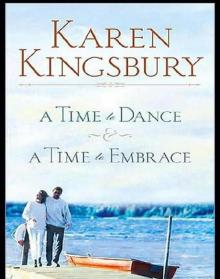 A Time to Dance
A Time to Dance Remember Tuesday Morning
Remember Tuesday Morning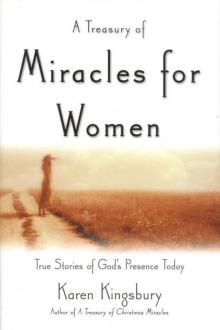 A Treasury of Miracles for Women
A Treasury of Miracles for Women Like Dandelion Dust
Like Dandelion Dust Brush of Wings
Brush of Wings The Tuesday Morning Collection
The Tuesday Morning Collection A Moment of Weakness
A Moment of Weakness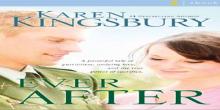 Ever After
Ever After This Side of Heaven
This Side of Heaven Unlocked: A Love Story
Unlocked: A Love Story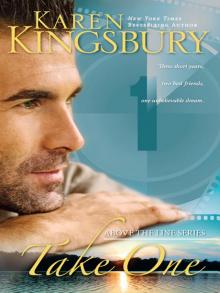 Take One
Take One The Red Gloves Collection
The Red Gloves Collection To the Moon and Back
To the Moon and Back Just Beyond the Clouds
Just Beyond the Clouds Oceans Apart
Oceans Apart A Baxter Family Christmas
A Baxter Family Christmas Fame
Fame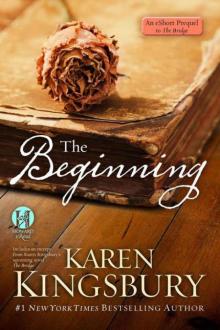 The Beginning
The Beginning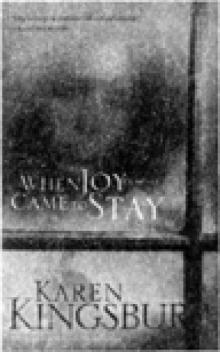 On Every Side
On Every Side Gideon's Gift
Gideon's Gift Forgiven
Forgiven A Kingsbury Collection
A Kingsbury Collection Found
Found Family
Family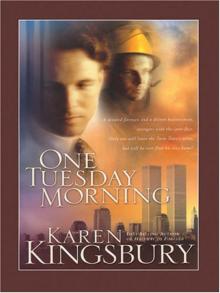 One Tuesday Morning
One Tuesday Morning Someday
Someday Take Three
Take Three Beyond Tuesday Morning
Beyond Tuesday Morning Unlocked
Unlocked Take Four
Take Four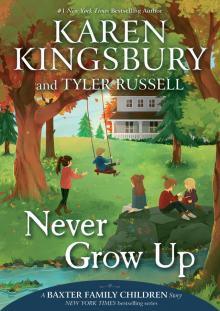 Never Grow Up
Never Grow Up Where Yesterday Lives
Where Yesterday Lives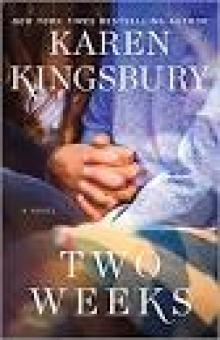 Two Weeks
Two Weeks When Joy Came to Stay
When Joy Came to Stay Halfway to Forever
Halfway to Forever Best Family Ever
Best Family Ever Sunrise
Sunrise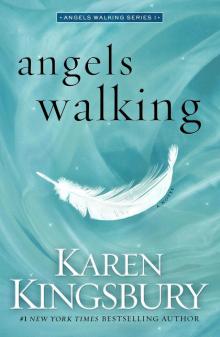 Angels Walking
Angels Walking A Treasury of Miracles for Friends
A Treasury of Miracles for Friends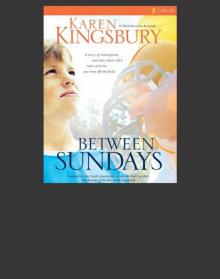 Between Sundays
Between Sundays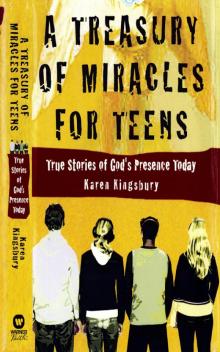 A Treasury of Miracles for Teens
A Treasury of Miracles for Teens A Thousand Tomorrows / Just Beyond the Clouds
A Thousand Tomorrows / Just Beyond the Clouds Finding Home (A Baxter Family Children Story Book 2)
Finding Home (A Baxter Family Children Story Book 2) Waiting for Morning
Waiting for Morning Chasing Sunsets
Chasing Sunsets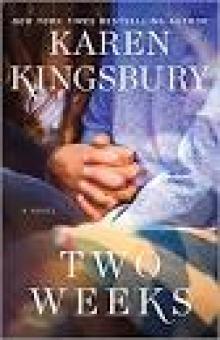 Two Weeks: A Novel (The Baxter Family)
Two Weeks: A Novel (The Baxter Family) Coming Home
Coming Home Final Vows
Final Vows Sunset
Sunset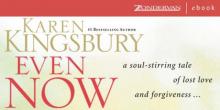 Even Now
Even Now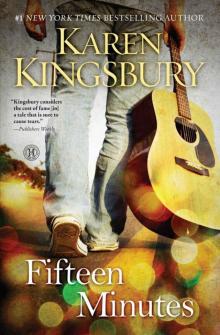 Fifteen Minutes: A Novel
Fifteen Minutes: A Novel Love Story
Love Story The Bridge: A Novel
The Bridge: A Novel One Tuesday Morning & Beyond Tuesday Morning Compilation
One Tuesday Morning & Beyond Tuesday Morning Compilation Truly, Madly, Deeply
Truly, Madly, Deeply The Chance: A Novel
The Chance: A Novel A Brush of Wings
A Brush of Wings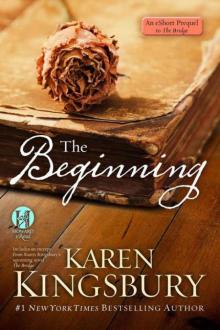 The Beginning: An eShort Prequel to the Bridge
The Beginning: An eShort Prequel to the Bridge A Thousand Tomorrows & Just Beyond The Clouds Omnibus
A Thousand Tomorrows & Just Beyond The Clouds Omnibus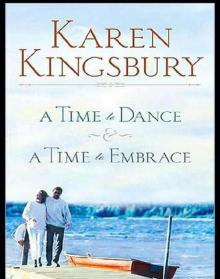 A Time to Dance/A Time to Embrace
A Time to Dance/A Time to Embrace In This Moment
In This Moment Rejoice
Rejoice Coming Home: A Story of Undying Hope
Coming Home: A Story of Undying Hope